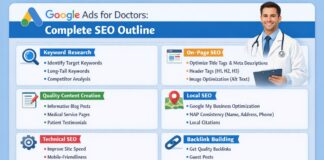Significant in healthcare management, medical data entry jobs serve as key components for the systematic recording of patient information by the organization. Key attributes of the professionals include accurate data through their consultancy, which ensures exact and immediate effects on the operations of patients and safety.
In the present scenario, when hard copies of patient management records are replaced with EHR, such professionals are more crucial in realizing higher levels of accuracy and better adoption of medical laws such as HIPAA compliance.
This essay will look at their respective responsibilities, abilities, and the issues faced, not to mention what the future has in store for them in the medical data entry jobs within the healthcare industry.
You’ll get a fair outlook throughout the day about how the efficiency of healthcare delivery can yet move to provision or outcome in patient safety improvement as one learns.
Introduction to Medical Data Entry
The work of medical data entry professionals is very critical in the healthcare field since they ensure the accurate organization, processing, and upkeep of patient info.

Mostly concerning the input of patient information, all different healthcare systems, paper record transfer into digital format, and updating electronic health records along with vital information jobs carried out on a daily basis. As the technology is growing and is availed by people, there is an increase in the importance of each medical data entry professional.
Patients’ data quality control is directly affecting medical care as the healthcare data entry experts make input. With immense attention to detail in their work, these professionals bring to existence complete and errorless data availability, which is vital for purposes of diagnosis, treatment organization, and follow-up care.
They work as intermediaries among different departments in a healthcare facility, ushering in more enhanced communication and working relationships among doctors, nurses, and administrative staff with properly updated and accurate patient information.
The present age embraces so much data, leading to a mushrooming of distinguished professionals, such as medical data entry professionals, whose functions have become very crucial to healthcare systems. Medical institutions rely on them to keep patient data correct to prevent erroneous information that could lead to poor patient care outcomes.
Furthermore, as they fulfill their functions, i.e., data entry work, they are resplendent with certain responsibilities just like those connected with regulatory compliance guidelines such as the HIPAA rules, proven by the fact that they protect from exposure the very sensitive patient information itself.
The emergence of electronic management data systems further enhances their importance in that profession. They can manipulate complex software and a database tool that tracks and manages patient outcomes better. Their role ultimately optimizes workflow within healthcare settings but also goes a long way in improving the well-being and safety of patients.
A healthy system that is considered an important part of the larger healthy system, it provides, therefore, high-quality patient care for patients and an excellent experience. With professionalism and dedication, these words give the much-required academic global sense for which the industry needs to be much more coherent in engaging technology and healthcare as partners, which is a way of leading to a more coherent pathway to health delivery.
The Importance of Data Accuracy in Healthcare
The critical importance of data accuracy in healthcare can easily be understood if it is realized that the breakthroughs in patient care and healthcare outcomes depend a great deal upon the accuracy of the data.

With digitization taking over health records, the jobs of medical data entry workers lie in picking up patient information from the repositories for transcription and insertion within the EHRs. The mismatch in any information entered may have an impact not only on a particular patient but also on larger public health aspects.
Mistakes in data entry can be lethal: misdiagnosis, inaccurate treatment, and even wrongful medication processes are facts. For example, someone’s allergic records withheld by health personnel may cause them to receive the wrong treatment, which is detrimental to their overall health. Therefore, the handling and management of data should be as accurate and astute as possible.
Not just the patient’s safety risks; erroneous records diminish the efficiency and agreement of the healthcare institutions. This would not be very easy, especially in clinical actions; important tests and treatments requiring duplication may be wrongfully done, thereby raising the costs of the healthcare system in the end.
This can also question healthcare provider credibility presence if the same mistakes keep occurring, potentially reducing the patients’ level of trust and satisfaction.
Data accuracy is necessary for conducting research as well as public health actions. On which dependable data of health care rest, clinical studies, and hence new understanding and policies in health arise, the data controlled the extent of development.
By far, significant progress has been generated in medical science and probable better delivery of health by collecting and entering accurate medical data.
In summary, data accuracy in health care leads to trust in the patient and enhances health outcomes. It is the responsibility of the data entry workers in the system to take good care of such information.
Key Responsibilities of Medical Data Entry Professionals
In the medical field, the job of a medical data entry professional is to help support and safeguard health care by keeping accurate patient information and up-to-date health data useful. A job involves getting information into health and medical charts. Their expertise lies in industry jargon, in knowing what medical terms mean so as to deliver data in line with what is expected.
Data collection is one of their core responsibilities. It is about getting the necessary data from sources like patient files, charts, and lab results. On the other hand, this process demands extremely careful work for one to make sure that what one is collecting is accurate and up-to-date when it comes to information.
The very last and crucial work that comes with this data collection is data entry. Data-entry work means posting information regarding the last visit a patient had, his medical history and treatment plans, and the charges to be made. Nevertheless, one also needs a know-how of medical terminology into which one can put that data as required by the industry.
One more duty of medical data entry professionals is that they maintain and update databases. They primarily guarantee the accuracy com, completeness, and extent to which the recordkeeping stays within a certain protocol or guideline.
This kind of ongoing effort in maintenance makes sure that the regular usage of the database by any provider is timely access to information for an excellent level of patient-provided care.
Besides, they have to set up strong preliminary steps in putting up protection and adhere to an extremely strict protocol of confidentiality and security for all information regarding the patient.
These professionals work closely with healthcare teams and make these real healthcare teams more cost-efficient and smooth in the operation. Within these teams, they play the integral task of communication, and the healthcare providers always receive complete and necessary information to make decisions based on the right information.
The Skills Required for Medical Data Entry Jobs
Data entry jobs in medicine are very important in ensuring the proper operation of healthcare facilities. Professionals in this line of work should develop a myriad of crucial skills pertaining to accurately and efficiently managing data.
Above all, attention to detail is such a useful skill. Data entry specialists, when dealing with medical information, are required to input sensitive patient information to avoid smaller errors that could lead to some severe consequences, such as misdiagnosis or improper treatment. Therefore, it is because of the necessity for accuracy and precision in their work.
Second, these employees should demonstrate proficiency in field-specific medical software applications and a variety of data management systems. Knowing electronic health records (HER), medical coding software and database application programs would streamline the data entry and retrieval processes of patient data. Acquiring skills in these technologies only serves to make data entry faster and reduces the probability of any errors.
Most of all, however, large containers of data require that effective organization be established for medical data entry professionals. In their daily multitasking duties, the medical data entry specialists ascend a list of activities, from updating patients’ records to ensuring regulation compliance and proper paperwork storage.
With these capabilities, their ability to prioritize tasks, manage time effectively and function effectively within a fast-paced healthcare environment was developed. Lastly, sound knowledge of the terminologies in health care is stressed for any medical open-data entry.
The understanding and knowledge of medical jargon and the abbreviations help in reading the information that was being entered and will help them communicate with other health care professionals accurately. Without that sound knowledge, misunderstandings among the health care professionals might occur, putting patient care at risk.
The Impact of Technology on Medical Data Entry
Radical changes have transformed the way data is currently being input into medical systems majorly through new technological developments. A variety of software applications and tools have been developed, which have streamlined the data-entry process and have increased the overall efficiency of this task.
Some significant changes are seen in the direction of Electronic Health Records (EHRs), which centralize all patient information and enable its easy access across healthcare providers. EHR systems have made it possible for the exchanging of medical data to be sped up, which in turn helps cut out the need for traditional paper-based records, making the delivery of care even more reliable.
On the other hand, EHR systems almost always integrate contraption tools for data input, such as automatic data entry capabilities, hence making precise and, at the same time, reducing errors in manual keying.
Healthcare providers can do this without hindrance due to the advanced algorithms and ‘intelligent’ ways of keying instead of manual techniques. Thus, this development would also reduce the workload of personnel who enter data in healthcare facilities and reduce the time spent on managing data, which would enable a more patient-focused care approach.
Automation transformations reveal an equally important role in the manipulations involved in the paradigm shift intended for medical data. Automation ensures compliance with the provisions and standards embedded within regulations, thus materializing how efficient data entry practices would be by the very means by which such automation may continuously monitor data entry functions, promptly flagging any possible discrepancies or inconsistencies revealed in the process.
This particular pre-emptive quality assurance of data marks a serious stand on limiting the potential risks of inaccuracy surrounding any patient’s data, which is one vital area healthcare domain.
Cloud-based solutions have been launched as a result, offering medical establishments such robust storage and management facilities, scalable and flexible depending on demands. Such systems allow real-time collaboration among care teams and can be made accessible across any number of locations.
Technology redefines the medical data entry landscape, optimizes efficiency and accuracy in data manipulation, and mainly improves care outcomes for the patient.
Training and Certification for Medical Data Entry Professionals
Being a medical data entry specialist requires a strong foundation in education and credentialing, usually with a graduate certification grade to ensure that a person is trained enough to fit certain medical careers. Many training programs are available to individuals, ranging from school-leaving certificate training to associate degrees, meant to equip candidates with rudimentary skills essential for effective data management in healthcare settings.
Among the typical topics likely in such a training course are the issues of health privacy guidelines, medical terms, and coding exercises along with data management mechanisms. Most of these programs are community college or vocational school programs and even Internet-based programs. In the end, it gives people flexibility to learn real quick and to add a skill set.
Usually, certifications are to show expertise in such careers in the practice data entry line, and probably the most popular organizations awarding such credentials as an endorsement of the candidate’s skills would be the American Health Information Management Association (AHIMA) or the Healthcare Data Management Association (HDMA).
When taking that examination, possible certified professionals will have to go through a very detailed assessment known to check student knowledge of medical coding systems, data privacy, as well as healthcare compliance standards. Moving another level up, a person is said to enhance job chances. Indeed, certificates may invite higher-paying jobs and upgrading opportunities under the healthcare domain glory.
Continuing education is a key area of concern in the evolving terrain of publishing healthcare data. Personnel ranging in this form must continue to be effectively updated with the recent trends in the industry, and the ever-emerging technologies or rules that can affect the management of data.
Enrollments in workshops and webinars, as well as in enhanced training programs, will help gain the competitive insights and skillset necessary to navigate these vulnerabilities within medical data entry. This shows commitment to ongoing professional development that develops a person into a better one in terms of career and accuracy in a health data system.
Challenges Faced by Medical Data Entry Workers
In the medical sector, the role of the medical data entry person is of immense importance in updating and taking care of the records of the patients as accurately as possible. But these undergo various problems hampering their efficiency and mental health. The greatest problem remains the squalls of data they have handled, which is obviously huge and needs to be inputted and considered further for its correct interpretation.
With fewer people demanding for the data to be digitized, data entry professionals often muddle swiftly to have it all up-to-date and accurate. This adds huge noise within them and subsequent errors that could be life-threatening when done in medical care.
Time frames also come with medical data entry tasks. Time is a huge aspect of medical data entry. This pressure does not only lead to functionality downtime, but also shifts the first fire-lost on to the employees. However, speed brings inaccuracy of information to those running the show, thus creating a dilemma that affects patient care performance.
Efficient data management systems are essential; however, these may not always be available or properly developed to further aggravate conditions for professionals in the field.
Hierarchical layers of complexity that add up are HIPAA and compliance requirements. Therefore, until the data entry procedures are revamped, it is critical to adopt and implement new automation and optimization techniques. So, in so far as the informal nature of medical data entry is concerned, punishment is going to be too severe.
Therefore, apart from being on top of attitudinal knowledge, he should also affix with even formal knowledge and would-be necessary training.
So also, working in medical data-entry jobs may pose an emotional and psychological toll. The privacy side of the spectrum of highly secure or sensitive patient data may breed feelings of anxiety or even distress, especially where information is sensitive to the individual’s physical health.
Striking the balance of confidentiality and emotional implications would be an uphill task for many who adopt such vocations.
The Future of Medical Data Entry Jobs
The landscape of data entry and medical jobs is changing rapidly, mainly due to the advancement of technology. The emergence of new models of care has increasingly revolutionized healthcare, and with that, the duties of the people managing data have expanded, too.
To enhance proficiency and accuracy in completing data entry tasks, the future might involve a great deal of increased AI and machine learning capability. Healthcare providers will be able to use these advances to automate those parts of data entry that have been deemed routine, making possible huge savings in time as well as almost removing any likelihood of human error for operational staff members.
One of the latest changes in the collection, analysis, and storage of patient data has been the application of electronic health records and various other software tools. Since these systems develop, so does the demand for greater sensitivity and confidentiality on the part of those individuals who could interpret, manage, and store effectively the sensitive data.
Above all, there is a desperate requirement for professionals in medical data entry with continuous updating in the form of learning and skill developments in their fields.
Another notable thing is that remote working will increase further for medical data entry jobs. After the initial resistance broke down due to COVID-19, telecommuting will become a common thing for many sectors, including healthcare.
By this, the employees who could now work remotely are further helped in gaining greater flexibility and being able to access an even bigger job pool. With the realization of such privileges as more cost-effective operations and more satisfied employees, hybrid working is a trend that will continue.
Future prevailing trends suggest the convergence of traditional skill sets with those that are recently evolved in successfully adopting roles within medical data entry job occupations. It is in this context that we will require an increasing level of technological embrace even as the exponents ensure that they have strong data correctness and data privacy standards through the provision of robust systems in the area of healthcare.
Adaptability, hence, becomes an asset worth harnessing when taking up some medical data entry jobs, given the dynamic nature that keeps evolving because of alternation in demand coming from industry trends.
Conclusion
That article Gives medical software data-entry tasks so important in the magnitude of better service delivery and management in the healthcare system, doing so can help enhance patient care. Data entry works, besides everything, are at the center of the health sector’s integrity and efficiency – delegates are often overlooked when it comes to the basis of their influence on patient care.
This article states that the magnitude of data generated in healthcare settings from patient history saves the data on treatments that require proper handling due to professional care.
In addition, vital information can be accessed and maintained with ease and reliability through handled skills of data input; with many controls that are brought into output management, given that the health facilities labeled data input professionals the backbone of digital information management, such would be better achieved by hospitals.
Besides being involved in vital e-records construction, the role of data entry enables medical policies and trend analysis. Perfect data entry brings a lot of health statistics within one scope; hence, these could incorporate political decision-making, resource allocation, and the development of newer medicines.
Managing data efficiently is important in producing better patient outcomes evidenced through higher cure and diagnosis accuracy, which crucially moves things mainly according to the basis of very properly entered data. For instance, proper entries can identify patterns in terms of treatments and patient responses, thus giving much-needed directions to the future of medical practice.
Summary: Ultimately, medical data entry is well-based in terms of healthcare by which one can say that well, accuracy and patient safety as well as care quality are directly affected. As we move on in healthcare, the need for good data entry professionals will increase so much more in the future by filling positions.
Because of their efforts, such as laying a good research foundation for good healthcare, good health outcomes and good support for decision-making under a lot of secure system reliability, it ensures efficient healthcare operation.
Thus, the importance of medical data entry positions for healthcare is indispensable, with the execution of the system smoothly and effectively for the paramedical multiples.









